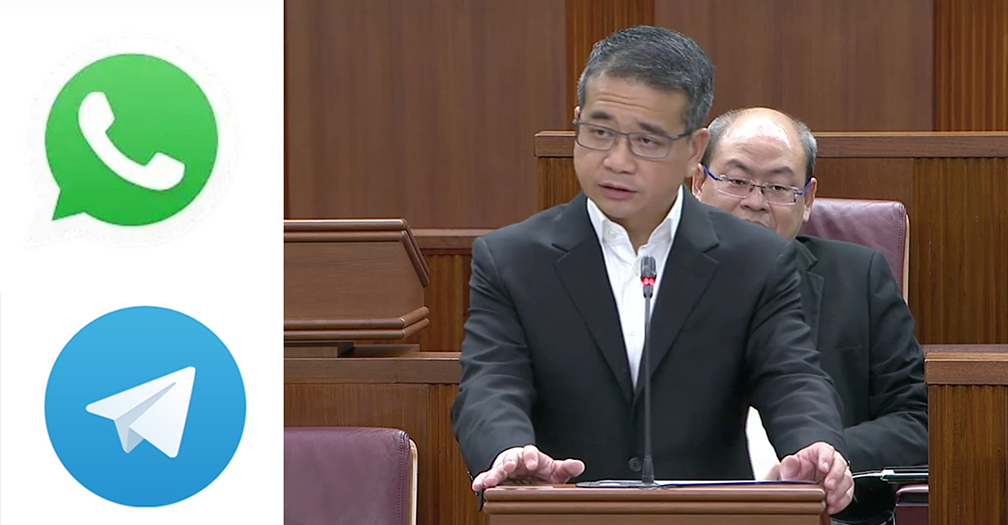The Protection from Online Falsehoods and Manipulation Bill (POFMA) will extend to closed platforms such as chat groups and social media groups.
This was the announcement made by Senior Minister of State for Law Edwin Tong in Parliament on May 7, at the Bill's second reading
Both open and closed platforms
In his speech, Tong said that directions could be issued against "false statements communicated over the internet, regardless of the platform".
"This means that the direction can be used against both open and closed platforms, and also remain flexible enough to deal with platforms that are developed in the future," he added.
Tong elaborated that the Direction would be issued by a Minister against a falsehood where it is in the public interest to do so, with the Courts having the final say over what is false.
As for the Direction itself, this could either come in the form of a correction of a falsehood, or taking down the falsehood, in which its communication to viewers in Singapore is ordered to cease.
In the latter case, this might also mean that a correction is sent to viewers who have already seen the falsehood.
Closed platforms are of major concern
Tong highlighted that closed platforms in particular were of serious concern to the Select Committee on Deliberate Online Falsehoods, due to how such spaces facilitated the spread of falsehoods by allowing them to be hidden from view.
Tong then cited researchers, adding that the spread of "emotive falsehoods" within these spaces is also exacerbated by how they are usually inhabited by the familiar and trusted.
As such, the legislation also covered closed communications platforms with end-to-end encryption.
For those of you wondering, this means that platforms such as WhatsApp and Telegram's secret chats will also fall under the purview of the Bill.
Closed platforms can still serve as public platforms
Tong said the rationale for including such platforms was because the Bill recognised they are not necessarily private.
He noted that while closed platforms are used for personal and private conversations, they can also be utilised to "communicate with hundreds or thousands of strangers at a time."
Accordingly, this made chat groups and social media groups "a public megaphone as much as open platforms."
Here's how a Direction addresses the spread of a falsehood on a closed platform
Tong stated that in the case of a falsehood that spreads through a closed platform, a General Correction might be issued as a Direction to halt the spread.
A General Correction would entail the issuing of a correction on certain platforms for their amplification, such as news outlets and Internet intermediaries, even if these platforms are not carrying the falsehood.
Tong elaborated that in this manner, the public will be made aware of the correction prior to the falsehood reaching them on a closed platform.
He added that psychological research had shown that corrections used in the same manner as vaccines could be very effective.
Bill designed for platform neutrality
Tong highlighted that the Bill had designed with platform neutrality in mind -- an important design principle that had been based on the Select Committee's findings.
This meant Directions can be issued against both open and closed platforms, and also remain flexible enough to deal with falsehoods spread on digital platforms that are developed in the future.
Moreover, additional ways of dealing with the spread of falsehoods through encrypted closed platforms would continue to be developed in the future.
Said Tong:
"We will also find additional ways of dealing with the harm that can materialise from falsehoods spreading on encrypted closed platforms."
Related story:
Top image collage from Telegram, Google Play and CNA
If you like what you read, follow us on Facebook, Instagram, Twitter and Telegram to get the latest updates.
